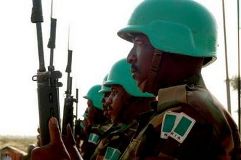Sudan agrees to accept UN attack helicopters
April 16, 2007 (KHARTOUM) — Sudan cleared the way for the United Nations to boost support for an African Union force struggling to maintain peace in Darfur when it agreed on Monday to accept U.N. attack helicopters as part of the plan.
 The new support package will mean deployment of 3,000 U.N. police and military personnel to bolster the AU force of 7,000 in the violence-torn western region. But Sudan has not agreed to a proposed larger force of more than 20,000 peacekeepers.
The new support package will mean deployment of 3,000 U.N. police and military personnel to bolster the AU force of 7,000 in the violence-torn western region. But Sudan has not agreed to a proposed larger force of more than 20,000 peacekeepers.
Khartoum had balked at the inclusion of six helicopters, fearful they could be used for offensive purposes despite U.N. assurances they would be there to protect the peacekeepers.
But on Monday, Sudan officially told the United Nations it would accept the helicopters. In a letter to Secretary-General Ban Ki-moon, Ambassador Abdalmahmood Abdalhaleem said, “I am pleased, upon instructions from my government, to convey to Your Excellency Sudan’s approval of the helicopter component.”
“It is the sincere hope of Sudan that implementation of the heavy support package would proceed expeditiously,” he said, referring to phase two of a three-phase plan.
The AU forces have been unable to stem the killing in Darfur and are increasingly under attack themselves. Sudan had already allowed phase one of the plan, a light support package of equipment, police, civilian staff and advisers.
The agreement on the helicopters came as AU chief executive Alpha Oumar Konare conferred in New York with Ban and the two envoys trying to fashion a peace accord — Jan Eliasson for the United Nations and Salim Ahmed Salim for the AU.
Ban told reporters afterward, “This is a very positive sign and I and the African Union intend to move very quickly” to deploy the expanded force. A U.N. statement said Ban called on Sudan to provide land and other facilities for it.
Experts say about 200,000 people have been killed and 2.5 million displaced since conflict flared in Darfur in 2003.
COMMITMENTS MADE LAST YEAR
Earlier on Monday, Sudanese Foreign Minister Lam Akol said in Khartoum that by accepting the helicopters, Sudan had fulfilled commitments made to the United Nations in Ethiopia last year.
“I can now say that Sudan has given its complete agreement to all that was discussed in Addis Ababa, and as such the path is open to the next steps, so that we can say that we have overcome the issue of peacekeepers in Darfur,” Akol said.
Akol did not say whether that meant the sides had agreed on a larger force but Khartoum has so far rejected a so-called hybrid force of U.N. and African troops.
Akol told Reuters on Sunday that while Sudan would accept however many African troops were needed to stabilize Darfur, it would not accept the deployment of international forces.
U.S. Deputy Secretary of State John Negroponte said after a visit to Sudan on Monday a U.N.-AU force was critical. In apparent recognition of Khartoum’s opposition to Western troops in Darfur, he said such a force would be mainly African.
“We must move quickly to a larger hybrid United Nations-African Union peacekeeping force with a single unified chain of command that conforms to U.N. standards and practices,” Negroponte told reporters in Khartoum.
“We also acknowledge and have agreed that the preponderance, the majority of these forces, will be recruited from African countries and the commander of this United Nations-African Union force will also be from Africa.”
U.S. State Department spokesman Sean McCormack called Monday’s agreement “a partial step forward” but said the threat of further U.S. sanctions against Sudan was “still out there.”
The U.S. ambassador to the United Nations, Alejandro Wolff, said he hoped it would now be possible to move forward, but cautioned, “We learned a long time ago not to take these letters at face value.”
Negroponte urged Khartoum to disarm militias accused of some of the worst assaults against civilians in Darfur. The militias, he said, “could not exist without the Sudanese government’s active support”.
(Reuters)
